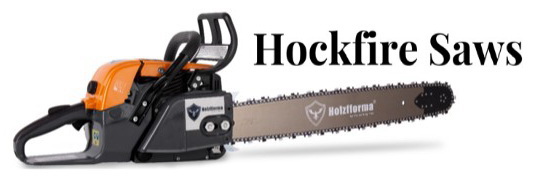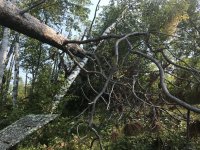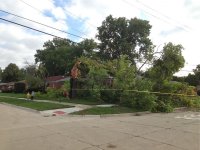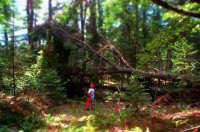I have done this for about 20 years, with a variety of volunteer groups. Each has its own culture, but training
before an event is very important. Even guys who have used saws for many years without incident may have different methods and approaches that can cause problems when working closely with other people, and other expectations. Some groups require each volunteer to take their orientation / training, even if experienced, just to '
baseline' everyone to common expectations and practices.
Disaster cutting can be very different than normal firewood cutting, due to: entangled debris, complex tension / compression / torsion forces, etc., along with just working in disaster environments. A good way to train groups is by doing service projects, such as clearing trails, helping out in parks, or finding areas where storms went through perviously, but were never fully cleaned up. It is hard to recreate a blow down scenario for training, but some gnarly situations may still be found 'back in the woods', even several years after a storm. Since you are with a church, there may be camps affiliated with your congregation or movement that might offer some 'win-win' training / service project opportunities.
PPE, as noted, should be mandatory. Whether your group provides this for shared use, or requires volunteers to provide their own, is up to you. But determine what your minimum standards are.
Back to your original question about equipment, you have a few options:
1. Each member brings their own, personal saw(s) and is responsible for it (them);
2. Your organization provides and maintains saws and related equipment;
3. Some combination of the above.
Note that disasters are hard on equipment. Volunteers are hard on equipment. Anytime things are shared, they are used harder than when used individually. This is not intentional misuse, but be prepared for the triple whammy.
I can't stress enough that immediately following a disaster chainsaw repair and maintenance parts will be impossible to find. Plan on bringing your own supply of spare parts and consumables, including: spare guide bars, sprockets, spark plugs, air filters, fuel filters, starter rope, bar nuts, chains, files, fuel, bar oil, etc. Standardizing on a few models of saws makes this easier, as well as simplifies training of new members. Consider spare parts for your PPE too.
Some groups I have worked with bring lots of extra chains, and clean up the damaged ones when they get back home. Some groups bring a grinder into the field and sharpen / repair chains each night. Some rely only on files. But figure that stuff out ahead of time, as local dealers will be picked clean and backed up.
I am open to most brands of chainsaws. Some groups I know started with less expensive saws due to the initial costs, but quickly realized that '
Pro' grade saws hold up better to the hard use; are easier to maintain / repair in the field; and have a wider availability of parts. Remember that you may be traveling far from your local dealer, so brands with national support are a big plus. A common combo for volunteer groups is:
Several STIHL MS260/261 saws with 16"
or 18" bars (pick
one) for general cutting;
A few STIHL MS460/461/462 saws with 24" bars, along with 28", 30", or 32" bars (pick
one) and skip tooth chains, for larger trees;
A STIHL HT131 or ECHO PPT2620H powered pole saw.
Along with axes, wedges, a manual pole saw (Jameson or Marvin),
anvil-style
compound loppers, small hand saws, first aid kits, cleaning / maintenance tools, stump vises, throw ropes and a bull rope, etc. I like an air compressor for daily cleaning. Having a vise mounted in an equipment trailer, and some fold up tables to work on are nice bonuses.
Network as much as you can with other volunteer groups doing similar work. You don't have to make the same choices that they did, but try to learn from their experiences. A good source is 'VOAD' (
Voluntary
Organizations
Active in
Disaster), which includes a number of faith-based sawyer response groups.
National VOAD -
https://www.nvoad.org/
Wisconsin VOAD -
https://wivoad.communityos.org/cms/home
Illinois VOAD -
https://ilvoad.communityos.org/cms/home
Send me a PM if you want to discuss this further, and maybe set up a phone call: too much to type! Happy to share any resources I have.
Philbert









